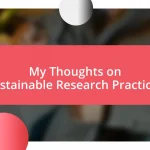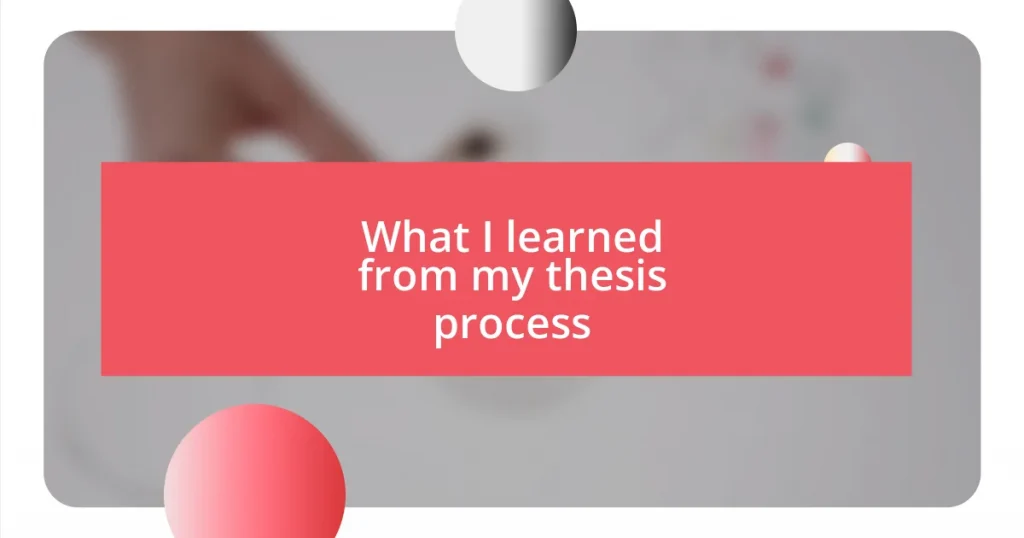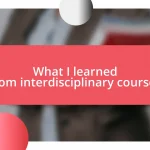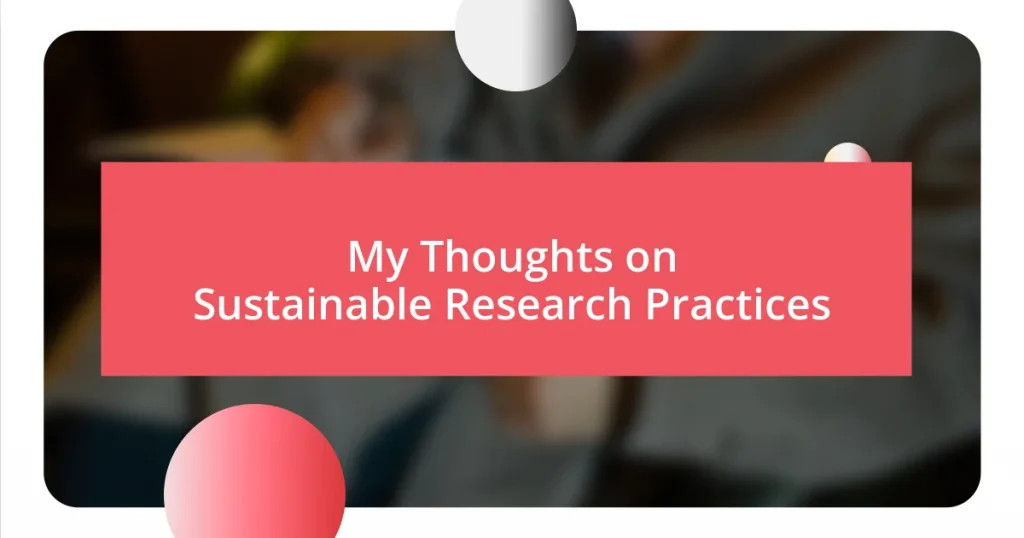Key takeaways:
- The thesis journey is emotionally challenging, emphasizing the importance of time management and creating a supportive community with peers.
- Effective planning and structuring through outlining and flexibility transformed the thesis into a cohesive narrative, making the writing process more manageable.
- Embracing feedback and revisions nurtured personal growth, resilience, and collaboration, building confidence and trust in one’s academic voice.
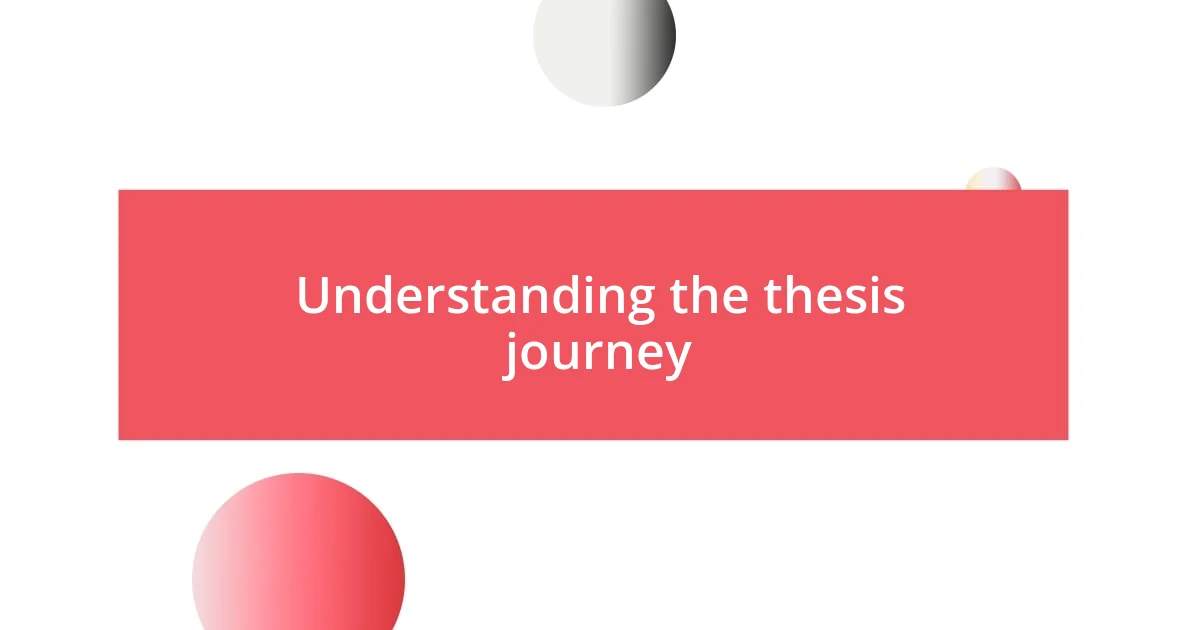
Understanding the thesis journey
The thesis journey can be a rollercoaster of emotions, filled with peaks of excitement and valleys of doubt. I remember nights spent staring at my computer, feeling the weight of expectations bear down on me. Have you ever felt that crushing sense of uncertainty? It’s almost like standing on the edge of a cliff, unsure if you should take the leap into the unknown.
Along with the highs and lows, this journey also taught me the importance of time management. I can vividly recall block scheduling my days, trying to carve out those precious hours for writing and research. Did I always stick to my plan? Absolutely not! It was a constant dance with deadlines, ultimately nudging me to find my rhythm amid the chaos.
What stands out the most, however, is the sense of community I developed with fellow thesis writers. Sharing frustrations and triumphs with like-minded peers turned daunting solitary moments into collaborative experiences. Ever had those moments where a simple coffee break turned into a brainstorming session? It’s incredible how those interactions can light a spark of inspiration when you’re feeling stuck.
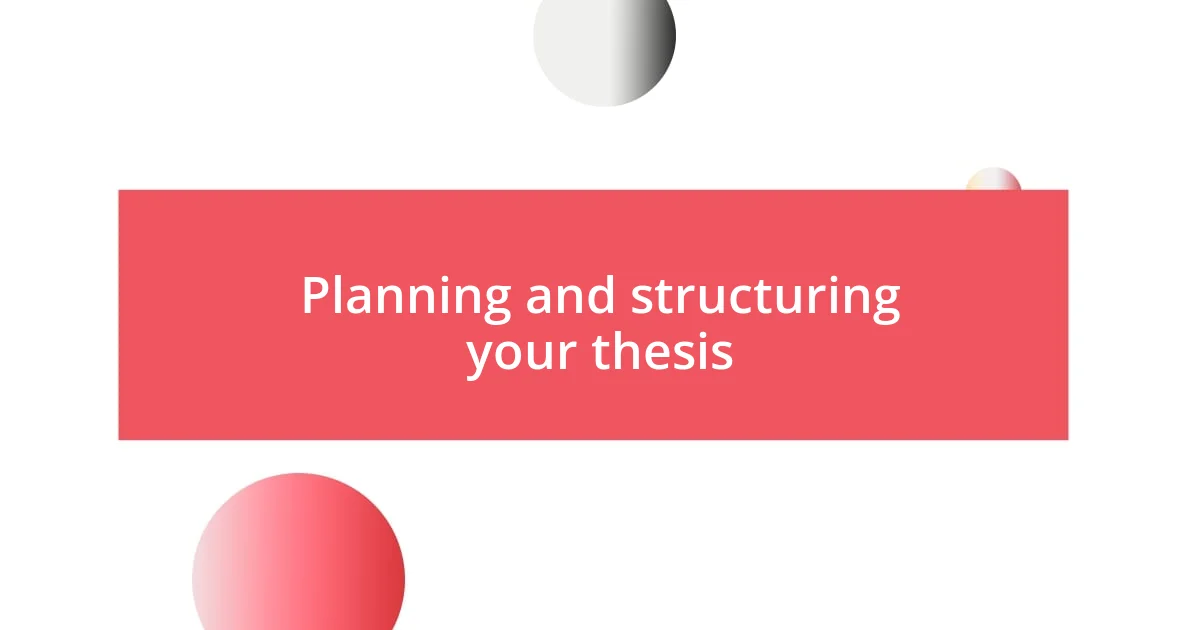
Planning and structuring your thesis
When I embarked on my thesis journey, I quickly realized that planning and structuring my work was crucial. I used to think that throwing ideas onto the page was enough, but without a solid outline, those thoughts felt scattered and overwhelming. One particular night, I sat down with a massive roll of butcher paper and mapped out my entire project. Seeing everything visualized in front of me was like flipping on a light switch — suddenly, I had clarity on the progression of my argument and how each section tied together.
An effective structure is what transformed my thesis from a jumble of texts into a cohesive narrative. I learned that breaking down my work into manageable sections made things less daunting. For instance, dividing my thesis into clear chapters with distinct focal points not only helped me stay organized but also made it easier to track my progress. There were days I allocated specific times just to work on one chapter, which created a rhythm that fostered productivity. Have you ever felt such a satisfying sense of accomplishment after completing a task? It made all the difference for me.
Ultimately, I came to appreciate the importance of flexibility within my planning. While I aimed to stick to my timeline, life has a way of throwing curveballs. I experienced moments where I needed to adjust my structure based on feedback or new research findings. Adapting to these changes made my thesis journey feel more like a dynamic evolution rather than a rigid process. How do you adapt to unexpected changes in your plans? For me, embracing this adaptability became a significant part of the overall growth experience.
| Planning Stage | Importance |
|---|---|
| Outlining | Provides clarity and direction |
| Chapter Breakdown | Makes progress manageable and trackable |
| Flexibility | Allows for adjustments based on feedback |
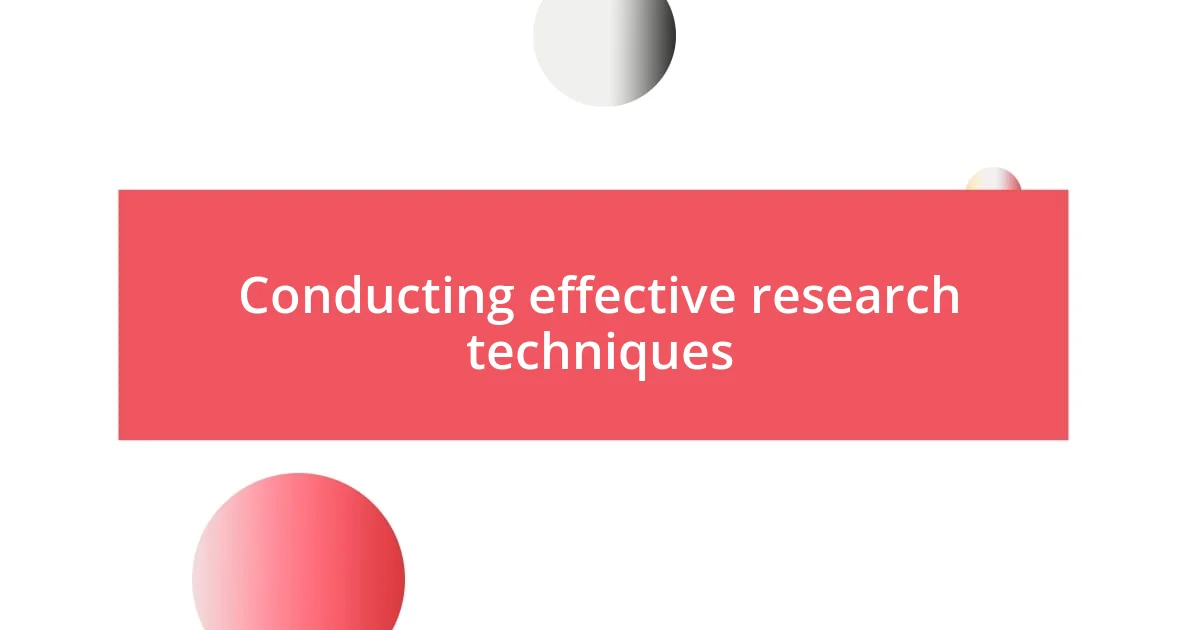
Conducting effective research techniques

Conducting effective research techniques
As I dove into my thesis research, I quickly realized that nailing down effective research techniques could make or break my project. I often found myself lost in the vast sea of information available online and in libraries. Establishing a solid process was essential. For instance, I developed a systematic approach to gather sources. I created a spreadsheet to catalog my findings, noting key details like the author, publication date, and relevance. This way, I could easily refer back to my sources without mixing everything up — and let me tell you, that saved me countless hours of searching later on.
Utilizing diverse research methods turned out to be incredibly valuable. I embraced both qualitative and quantitative techniques, which gave my work depth and perspective. Here’s a quick rundown of the techniques I found most effective:
- Interviews: Engaging with experts provided a human touch and real-world insights.
- Surveys: Gathering data from participants added an element of empirical evidence to my arguments.
- Literature Reviews: Exploring existing work enriched my understanding and helped me position my thesis within the broader conversation.
I remember one particularly enlightening interview with a professor whose insights opened up a whole new angle for my analysis. The excitement I felt during that conversation still lingers — it was a reminder of the wealth of knowledge others can share, making the research process feel less like a burden and more like an adventure.
Developing a well-rounded approach to research ultimately transformed my workflow. I’m often reminded of the saying, “research is never done.” It’s true! I found that being open to ongoing exploration and learning made my thesis not just a project, but a journey of discovery. And trust me, each piece of information gathered felt like a piece of a puzzle clicking into place, leading me closer to my final picture. Have you experienced that thrill when a new source perfectly aligns with your argument? It’s those moments that truly make the research worthwhile.
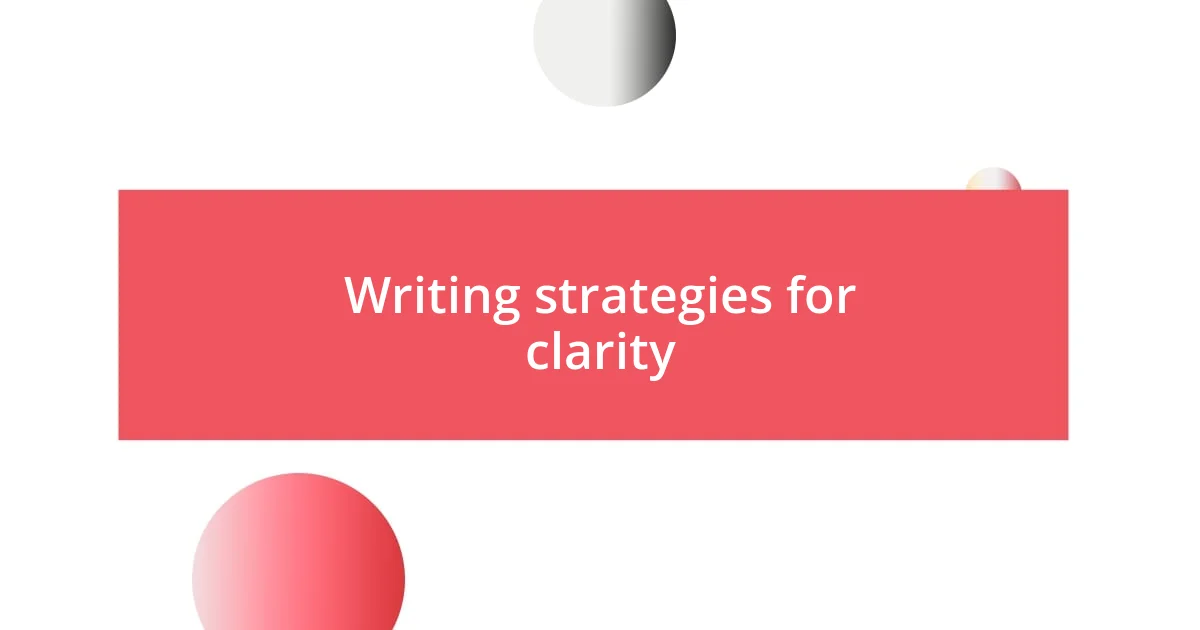
Writing strategies for clarity
Writing with clarity is a skill I honed throughout my thesis process, and I can’t stress enough how vital it is. Early on, I discovered that using straightforward language and avoiding jargon made my arguments much easier to understand. I often imagined my reader sitting across from me, and I’d ask myself, “Could they grasp this idea if I shared it aloud?” This perspective ensured I communicated my points engagingly and accessibly, which was a revelation for my clarity.
One technique I found particularly helpful was the practice of explaining complex concepts in simple terms, as if I were teaching someone who had no background in the subject. For example, when discussing intricate theories, I would break them down into bite-sized explanations followed by relatable examples. I remember drafting a section where I compared a challenging theory to playing chess; this analogy not only made it relatable but also stuck with my readers. How often do we remember concepts better when they connect to something familiar? It’s profound how a simple analogy can illuminate a whole section of your writing.
I also learned the power of revision in achieving clarity. After completing a draft, I would step away for a day or so. Upon returning, I would read through my work with fresh eyes, looking for areas where I could tighten my language or clarify my ideas. This process was immensely rewarding. I couldn’t believe the transformations some sentences underwent just by cutting out unnecessary words! This habit taught me that clarity is not a one-time achievement — it’s something that develops through reflection and iteration, making the writing process itself an enlightening journey. Who knew that every round of revisions could reveal something new? It certainly added a layer of excitement to my work!
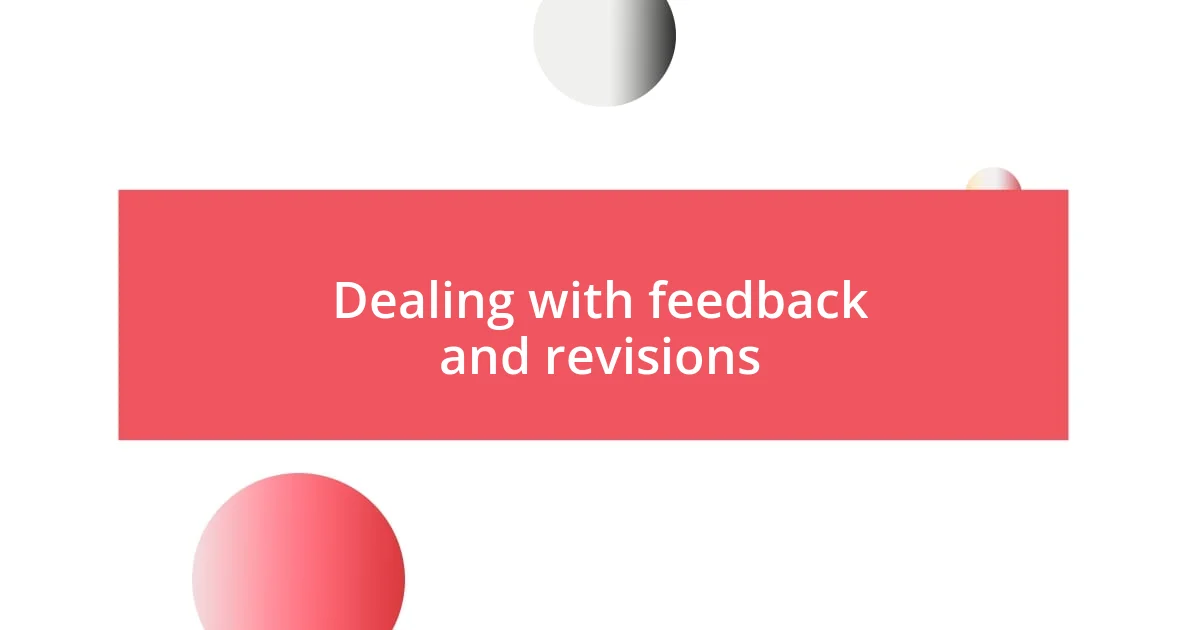
Dealing with feedback and revisions
Feedback and revisions can truly feel like a double-edged sword during the thesis process. When I first received feedback on my draft, my initial reaction was a mix of anxiety and defensiveness. Can anyone relate? Over time, however, I learned to view feedback as an opportunity rather than a critique. The moment I shifted my mindset to embrace constructive criticism, it became evident how invaluable those insights were in refining my work. I mean, isn’t it fascinating how an outside perspective can illuminate strengths and weaknesses that I might have overlooked?
Working through revisions often turned into a personal journey for me. I vividly recall a moment when my advisor highlighted a section where my argument seemed unclear. Instead of feeling discouraged, I decided to dive deeper into my thought process. This led me to reorganize the section completely and, in doing so, my ideas fell into place so much more cohesively. It felt like solving a puzzle, where each piece had to fit just right. Have you ever felt that exhilaration when you unlock a clearer way to present your ideas? That was one of those moments for me, an exciting realization that revisions can help clarify your thoughts, not just polish them.
There were times when the revising process felt endless, and I often questioned whether I would ever get it just right. Yet, through repeated iterations, I came to deeply appreciate this cycle of feedback and revision. Each round taught me something new about my writing voice and the clarity of my arguments. I can’t help but ask, isn’t that the beauty of the writing process — the way our ideas evolve and improve over time? For me, every piece of feedback became a stepping stone toward a stronger thesis, revealing layers of understanding that I hadn’t anticipated.
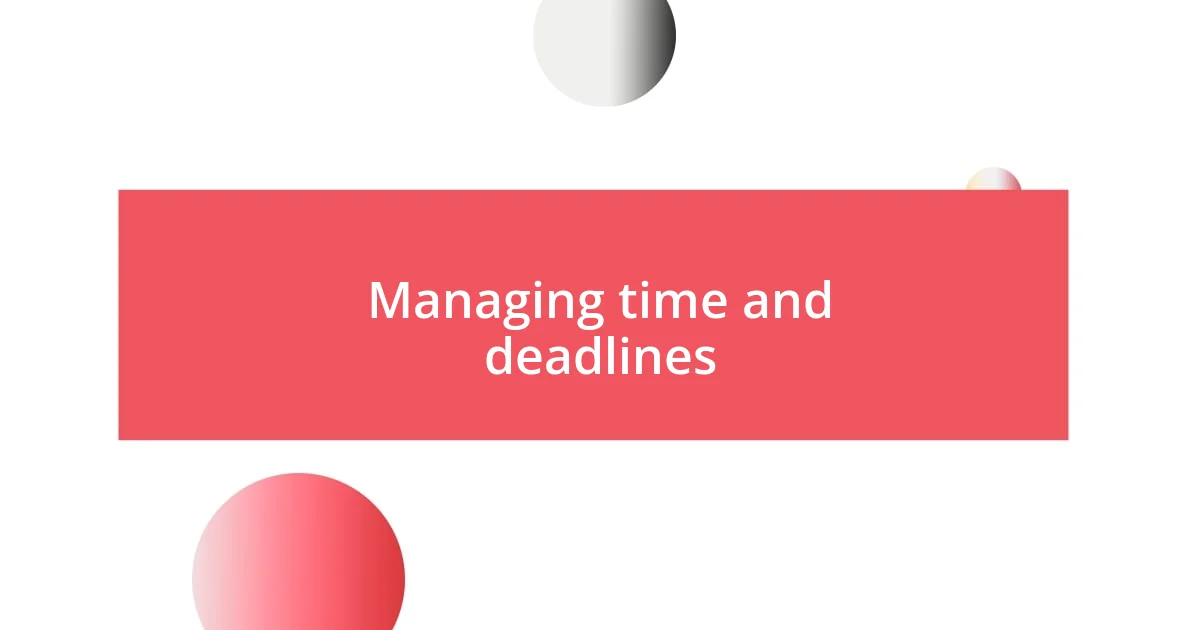
Managing time and deadlines
Managing time and deadlines was one of the greatest challenges I faced during my thesis journey. Initially, I felt overwhelmed by the sheer volume of work ahead. It wasn’t until I began breaking my project into smaller, manageable tasks that I started to breathe more easily. I vividly recall how I set aside a dedicated time each day for writing, even if it was just an hour. I started to think of those sessions as sacred, and they ultimately prevented the stress of last-minute rushing. Have you ever experienced that relief when you start ticking tasks off your to-do list?
One technique that worked wonders for me was scheduling specific milestones. I created a timeline with clear deadlines for each phase of my thesis—from literature review to final revisions. As I quickly realized, having these benchmarks not only helped me stay organized but also motivated me to push through the more challenging sections. I would often find myself looking forward to checking milestones off, which kept my energy high. When I achieved a significant goal, like completing my first draft, I allowed myself a little celebration. Isn’t it amazing how rewarding it can feel to treat yourself for hitting those deadlines?
I also learned the importance of flexibility in my schedule. Life has a way of throwing curveballs, and my thesis process was no exception. There were days when I struggled to meet my planned timeline due to unexpected personal events or moments of writer’s block. Instead of growing frustrated, I practiced shifting my deadlines, allowing for grace without losing momentum. This taught me that sometimes, adjusting my expectations was just as critical as staying disciplined. Have you ever found that adjusting your approach can actually lead you to greater success? Each obstacle turned into a valuable lesson, and over time, I became more skilled at balancing the demands of my thesis and life.
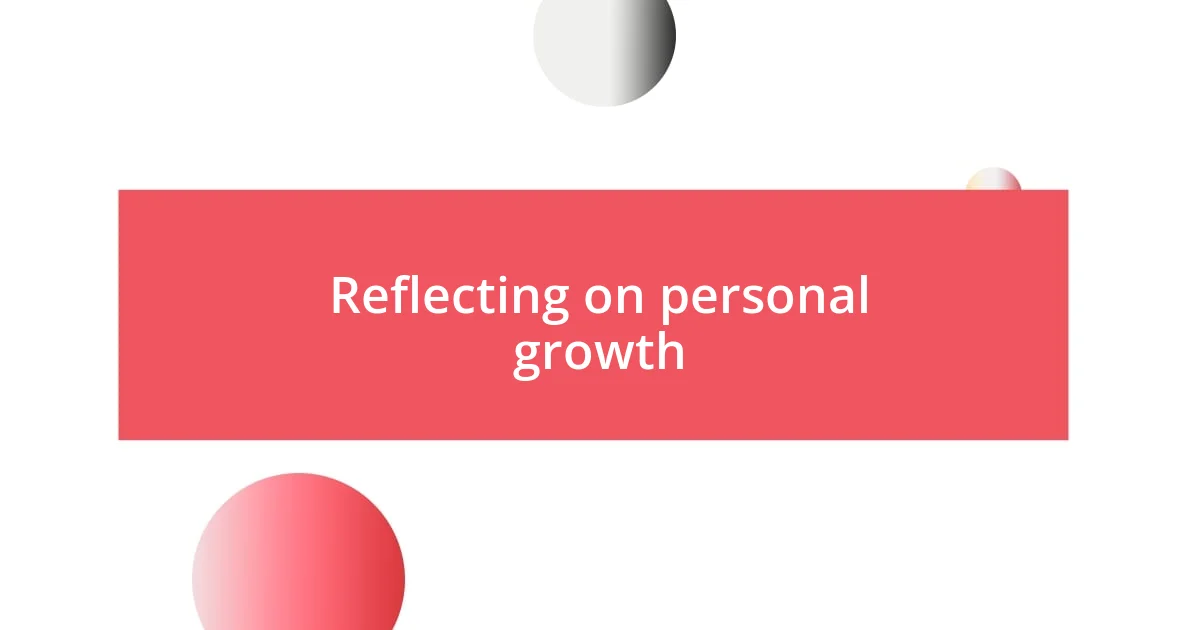
Reflecting on personal growth
Reflecting on my personal growth during the thesis process has been eye-opening. One moment that stands out vividly for me was when I realized how much my confidence evolved. In the early stages, I often doubted my capabilities. But as I pushed through challenging sections, and witnessed my ideas come together, I began to trust my voice more. Isn’t it remarkable how tackling challenges head-on can change your perception of yourself?
Through this journey, I also learned about resilience. There were days when I felt completely stuck and questioned whether I was cut out for this. I distinctly remember sitting at my desk, staring at my screen with an empty mind. Instead of giving in to frustration, I took a break, went for a walk, and allowed my thoughts to wander. Those moments of reflection often sparked new ideas and solutions. Have you ever found that stepping away can sometimes be the best way to move forward?
Finally, the thesis experience taught me the value of collaboration. Engaging with peers and discussing our struggles created a sense of community that I hadn’t anticipated. Sharing triumphs and setbacks with others made me realize we’re all in this together, navigating similar challenges. It’s comforting, isn’t it? That sense of belonging and mutual support fostered an environment where I felt empowered to grow not just academically, but personally. Those connections became an unexpected source of strength that contributed immensely to my overall development.


